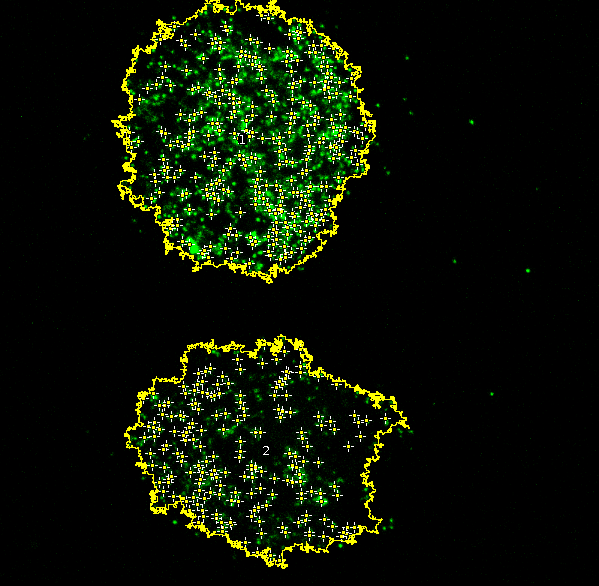-
Notifications
You must be signed in to change notification settings - Fork 16
Analyse Spots Per Protoplast
The tool counts the spots per protoplast. If a third channel is provided it is used to filter out detected protoplasts that do not have exactly one nucleus. The tool expects a hyperstack with the channels
- spots (green)
- protoplasts (grey)
- nuclei (blue, optional)
An example image can be found here.
You can find the source code of the tool here.
To install the tools, drag this link to the ImageJ launcher window, save it under macros/toolsets in the ImageJ installation and restart ImageJ. In order to be able to detect the spots, you need to download the gdsc plugins from the website of the University of Sussex. Put the file into the plugin folder of your ImageJ.
Select the Analyse_Spots_Per_Protoplast toolset from the >> button of the ImageJ launcher.
- the first button (the one with the image) opens this help page
- the a-button analyses the current image
Open the options-dialog by right-clicking on the a-button.
- Protoplasts thresholding method: the thresholding method used to segment the protoplasts (MinError or Huang should be good choices)
- Protoplasts min. size: the minimum size for the segementation of the protoplasts, note that when remove-scale is selected the size is in pixel.
- Nuclei thresholding method: the thresholding method used to segment the Nuclei (Huang should be a good choice)
- Nuclei min. size: the minimum size for the segementation of the nuclei, note that when remove-scale is selected the size is in pixel.
- Remove scale: when selected the scale will be removed from the image and the sizes must be provided in pixel
Open an image which contains the two or three channels needed and press the a-button.
|

-
Berthelot, E., Ducousso, M., Macia, J.-L., Bogaert, F., Baecker, V., Thébaud, G., Gallet, R., Yvon, M., Blanc, S., Khelifa, M., et al. (2019). Turnip mosaic virus is a second example of a virus using transmission activation for plant-to-plant propagation by aphids. Journal of Virology.
-
Edwige Berthelot. Etude de l’activation de la transmission du Turnip mosaic virus par pucerons. Sciences agricoles. Montpellier SupAgro, 2018. Français. ffNNT : 2018NSAM0039ff. fftel-02533857f


 Volker Bäcker
Volker Bäcker